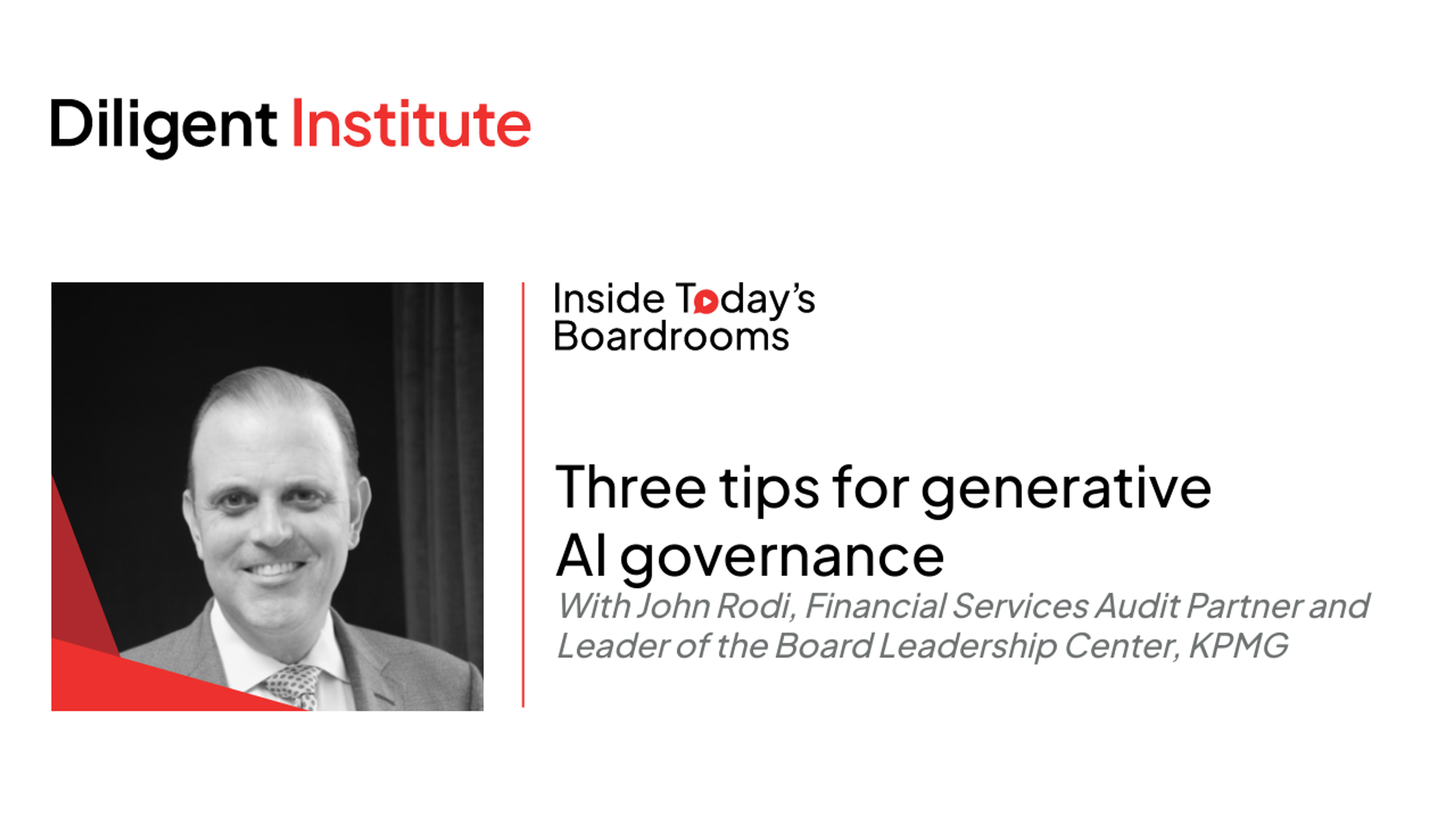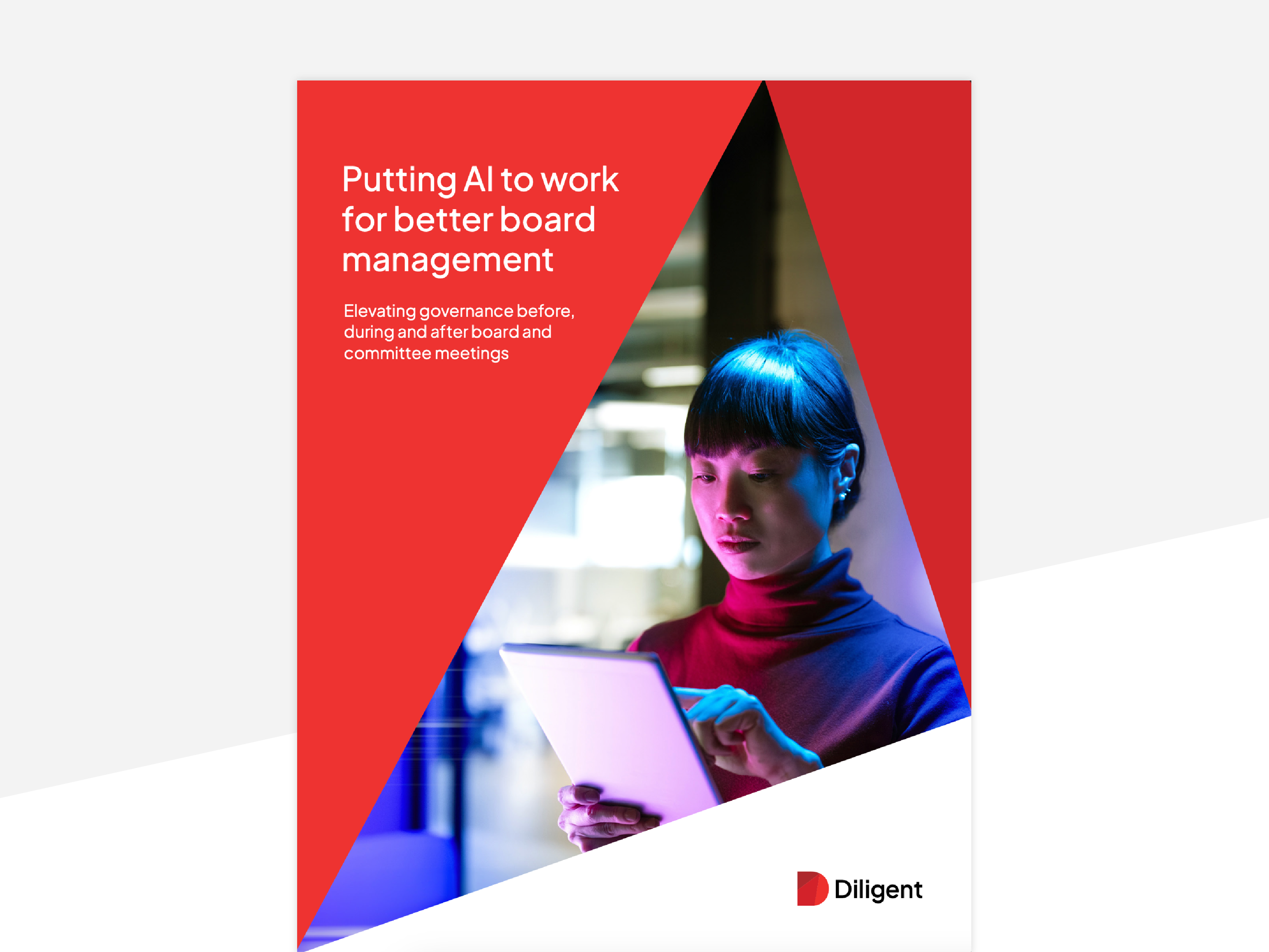Is your board ready for AI’s ethical crossroads?

What happens when a boardroom falls behind the curve of a technology that’s reshaping industries, economies, and ethical boundaries all at once? Artificial intelligence isn’t just another trend — it’s a transformational force. And boards that fail to engage meaningfully with its governance risk more than missed opportunities; they risk irrelevance. In this shifting landscape, how can boards lead with confidence, foresight, and accountability?
In the below video from Diligent's Education & Templates Library, Andrea Bonime-Blanc, CEO, GEC Risk Advisory, Board Member, Advisor & Author of Governing Pandora (2026), explores the board's role in AI oversight and best practices for fostering robust AI leadership.
Andrea makes several things clear for boards: continuous education and proactive oversight are key to a successful AI governance program. Reviewing board skills and expertise, and identifying gaps to address, will also help boards understand how they can enhance their AI literacy and oversight.
Here we review some of Andrea's key points in more detail:
The importance of continuous education
- Continuous education is vital for board members, particularly those who are not digital natives. The board chair should play a key role in facilitating this education, ensuring that all members have access to the necessary resources and training.
- Board members should demonstrate curiosity, acknowledging their knowledge gaps and actively seeking to learn more. This can be achieved through workshops, seminars, and bringing in external experts to provide insights and training.
- Conducting a skills matrix analysis can help identify areas where new members with relevant expertise are needed to enhance the board's capabilities. This ensures that the board has a well-rounded set of skills to address the complexities of AI governance.
Proactive oversight
- Boards should actively engage in overseeing AI adoption by asking management about the significant risks and opportunities associated with new technological developments. This proactive approach ensures that AI initiatives are aligned with the organization's strategic goals and that potential issues are identified and addressed early.
- It is essential to have a high-level C-suite or executive person responsible for AI oversight, who is part of the executive team. This individual can ensure that AI governance is prioritized and that the board receives timely and accurate information.
Integration of AI oversight into governance structures
- AI governance should be integrated into the existing organizational structures through a whole-of-board approach. This means recognizing the significant and potentially existential impact of AI on the business and society.
- While risk and audit committees can be a starting point, AI oversight should not be confined to these committees alone. Forming a standalone committee focused on AI and other exponential technologies can provide more specialized and effective oversight.
- The integration of AI oversight into the broader governance framework ensures that all board members are attentive to AI-related issues and can contribute to strategic discussions. This holistic approach helps in making well-informed and balanced decisions.
Skills matrix analysis
- Conducting a skills matrix analysis is essential to identify gaps in the board's expertise related to AI. This analysis should assess the current knowledge and skills of board members and highlight areas where additional expertise is needed.
- Boards should actively seek to bring in new members with relevant knowledge and experience to fill these gaps. This can be done through targeted recruitment or by engaging with external advisors and consultants.
- A well-rounded board with diverse expertise will be better equipped to handle the complexities of AI governance and make informed decisions.
Existential risks and opportunities
- AI and other exponential technologies present both significant opportunities and potential existential risks. Boards must be vigilant in identifying and mitigating these risks while also exploring the strategic advantages that AI can offer.
- Recognizing the existential impact of AI involves understanding how it can fundamentally change the business model, market dynamics, and societal norms. This recognition should drive a proactive and comprehensive approach to AI governance.
- Balancing risks and opportunities requires a nuanced understanding of the technology and its implications. Boards should ensure that the organization has robust risk management frameworks in place while also fostering innovation and strategic use of AI.
Effective board governance of AI is a multifaceted and dynamic process. By adopting a proactive and comprehensive approach, continuously educating themselves and integrating AI oversight into existing structures, boards can guide their organizations through the complexities of AI and position them for success in the digital age.
Enhance your AI oversight with Diligent's Education & Templates Library
Diligent's Education & Templates Library features curated libraries of eLearning courses, certifications, templates and videos on key GRC topics, including AI governance, risk management and ethics. Explore and learn as the Diligent Education & Templates Library continues to grow, ensuring the latest insights and guidance.
About Andrea
Andrea Bonime-Blanc, JD/PhD, is the CEO & Founder of GEC Risk Advisory and an expert in governance, strategic risk, sustainability, and exponential technologies. A former C-suite executive, she advises global businesses, NGOs, and governments, and serves on multiple boards. She is a Senior Fellow at The Conference Board and NYU’s Center for Global Affairs, and Ethics Advisor to the Financial Oversight and Management Board for Puerto Rico. Recognized by Diligent Governance 100, NACD Directorship 100, and Ethisphere’s 100 Most Influential in Business Ethics, Andrea is the author of Gloom to Boom and the upcoming Governing Pandora (Georgetown University Press, 2026).
More to explore

AI governance: What it is & how to implement it
Discover the essentials of AI governance and learn practical steps to implement it in your organization for ethical and effective AI use.

Three tips for generative AI governance
John Rodi, partner at KPMG, gives insight into proper oversight and governance of generative AI in this episode of Inside Today’s Boardrooms.

AI for smarter board management
See how AI is transforming corporate governance. Learn how to automate tasks, enhance compliance and make data-driven board decisions. Download now.